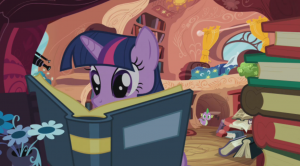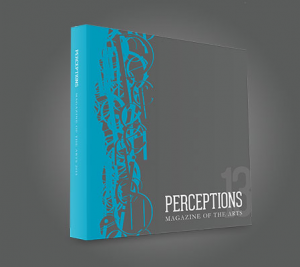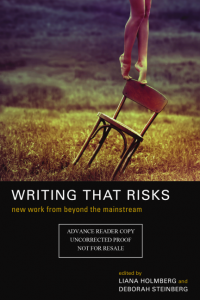Psychology of Writing: Aggressive Personalities (Part 1)
The definitions I’m using in this post are from the book “In Sheep’s Clothing” by Dr. George Simon, a psychology book that is sometimes dismissed as being more of a self-help book in that the definitions used have not been accepted into the Diagnostic and Statistical Manual (DSM), and it’s designed for people to help themselves regain control while within an abusive relationship. While terms used here are similar to those in the DSM, the definitions and criteria for diagnosis may be different. Do what you will with using this in your daily relationships, but in terms of writing, this is a good framework.
Read MoreOn the Ethos of “The Writer”
I had a friend at UC Irvine who constantly talked about “The Writer.” The idea of “The Writer,” as I understand it, is a creation of movies and the media. It’s a cultural stereotype of what writers are, and aspiring writers tend to take this and romanticize it. This makes sense; if one wants to be a writer, they might try to adopt the traits of a writer.
But many of these traits are not even related to writing. Sometimes it feels like bad marketing in practice. Going “Real writers like wine. So if I want to be a writer, I should drink wine” feels very similar to “LeBron James drinks Sprite. So if I want to be a basketball player, I should drink Sprite.”
Some of these aspiration fantasies are downright destructive if emulated: aggrandizing dysfunctional relationships, symptoms of mental illness, and substance abuse.
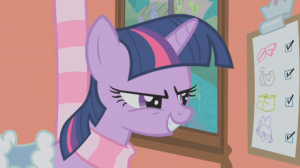
“Scarf to look pensive in the cold. Check. Saddle that looks great in black and white photographs. Check. Galoshes because they were referenced in James Joyce’s “The Dead.” Check. Abusive relationship. Check. And I’m already drunk. Guess who’s ready for AWP.”
I don’t know why my friend was so obsessed with conforming to this stereotype. It might have been because he transferred to being an English major from something completely different and did so late in his academic career. I don’t know if he became infatuated with “the writer” because he was insecure around all these more knowledgeable English majors or if it was his infatuation with the writer image that made him transfer to begin with.
Now my friend is by no means alone. I’ve been to three schools now with three very different writing communities, but all of them had this same common feature. There were students who had a view of “the writer” ethos. I see this either used as a goal, “I need to start doing drugs to become a great writer” (Do not do this). Or it’s used to justify a present lifestyle “I do so many drugs, because that’s what writers do.”
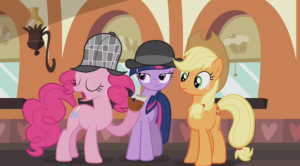
“I smoke a pipe, because I’m a writer. Tobacco? No, it’s full of DMT, the chemical your brain releases when you die. I’ve experienced the moment of death. Have you experienced the moment of death?”
Now I’ve been friends with many writers throughout their entire careers as they’ve unfolded thus far. They’ve changed their mind about certain things after gaining new experiences about the literary world. The friend from UC Irvine went on to work at an agency. Before this job he used to be someone who cared about quality and personal truth. Then he redefined what “the writer” does. According to a phone call I had with him, he said “the writer” keeps track of market trends and writes what is needed.
I don’t think most writers whose name you actually know have ever done that. It’s usually the insecure bottom feeder authors with no vision who do this. But this tells something about the nature of worshiping the image of “the writer.” We make the “the writer” in our image to reaffirm our identity, but also to put ourselves in a status above others who do not fall into our arbitrary categories.
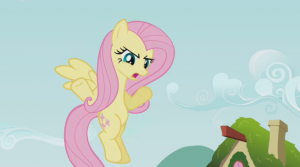
“Real writers have wings, pink hair and a butterfly cutie mark. It represents a unity with nature which is a left over ideology from the Romantic Era poets. But you wouldn’t know that because you’re not a special writer like me. I realized this on my morning walk. Morning walks are something the writer does. If you don’t take morning walks, then you’re not a real writer…a real writer like me. I’m a real writer. My mom was not right about me wasting my time and money on a career path that will never bring me happiness or success. I’m not wasting my life!”
The problem is everyone actually is a scholar of literature to some degree. Everyone enjoys some media of storytelling and poetry somewhere in their lives, whether it is advertisements, conversations, TV, movies, blogs, books… But when everyone is a scholar to some extent, a writer might feel that they have to do much more to separate themselves from the rest of the world, make themselves stand out and be special.
I try to avoid generalizations about what “the writer” does. It is damaging to the art form. We get all these wonderful and diverse people from all walks of life coming in to give their experiences of the world, but what do we do? We encourage them to conform to a hipster douche bag who drink a certain type of liquor and has terrible relationships. If someone is suggesting you’re less of an artist for being who you are, that person knows nothing about art or sex they couldn’t read in any trendy, New York, underground, fashion magazine.
I’ll admit I stole that last line from Say Anything (the band not the movie).
While I don’t believe that there’s a particular way that writers must be, I think there are definitely attitudes and behaviors that, if adopted, would greatly benefit a writer. Some of them are as follows: be eager to learn, accept criticism, learn to get the message despite the messenger, learn other people’s perspectives (including people you hate and who have wronged you), be open to new and different strategies, be open to the idea that even though you think you do these things that you might not actually do them as well as you think…
I have received criticism for this blog saying that it wasn’t very literary because of the ponies.
These people are well-meaning. They’re trying to look out for my career, but I feel like they don’t quite understand why or how I write. I don’t want to put a fake smile on and try to write about writing in a very general sense, blindly reposting writer porn, challenging nobody, making no original thoughts, and any angst or pain should be packaged and exploited for the sake of “seeming real.”
If other people think that acting out a crafted character and pretending you are this person on the internet (Wow, I never realized how much writers have in common with furries), then more power to you. I do not believe this is a behavior that should generate a real fandom nor should it generate respect among your peers. But it is what everyone is told to do in writing school, so I assume it is safe.
I’m taking a different road. I do not see writing a fake blog where I pretend to be a version of myself who is more like “the writer” and less in love with My Little Pony as a proper use of my talents or my time. I will stand out by being myself. Let’s see how that turns out.
Read MoreVideo from the LA Times Festival of Books!
If you recall I did a poetry reading at the LA Times Festival of Books. Finally, here is the video so that you can lie to your friends and say that you were there! Or if you’re just curious about the type of writing I do, well sorry, but this is mostly just poetry. But if you want to see the type of poetry I do then here’s the video!
The video is awesome. There are people laughing and groaning, and there’s a poem about a Roomba, and a humor piece about a heterosexual unicorn, and a sad thing about crows, and something about Laika (the first dog in space), and this thing based on this Noam Chomsky quote about green ideas dreaming furiously. OH YEAH THERE’S A POEM ABOUT MY LITTLE PONY!
Introduction by Caron Tate (0:00)
Humor List
Uncovering a Unicorn Mare’s Nightmare: Signs Your Son Is Only Attracted to the Opposite Sex (1:11)
Poetry
The Art of Being Expendable: An Instruction Guide (3:33)
Crow Parenting (5:11)
The Roomba Suicide (6:05)
Best Pony (8:00)
How to Treat Your Ideas (13:40)
The Art of the Dress: Lesson on Criticism
As I write this I am recovering from Comic-Con and battling against a deadline where a short story wrote needs to be second final drafted. After meetings with my adviser she had told me a lot of her comments verbally, and we were largely on the same page. I was shocked to see that on the written pages there were way more notes, and it was worse than I had thought.
Before we get started, any bronies and non-bronies might want to (re)watch the first part of the song to get the context of this post.
I had a little too much fun writing this story. I added a lot of avant-garde elements that were definitely too experimental. Some of the tools were things like excessive footnoting, the pretense of the story being historical fiction from the future about our times, animal dialects, pop culture references, sci-fi fantasy sequences, and treating animal languages as being tools manufactured by their perception of the world (my take on the Whorfian Hypothesis).
It was fantastic for a writer like me who loves the social sciences to create the politics and social dynamics of this world. And just in terms of technique, and what I needed to earn was one of the most ambitious pieces I had ever attempted. The first draft was far from perfect, but considering how many ingredients for failure I threw into the mix, I dared this story to fuck up. Yet with theory I knew how to make it all work, or so I thought, or so I’m thinking.
Regardless of how this turned out, I had an incredible time writing it: minding the intimate details. It was like I was twirling around my room, carefully cutting all the pieces of the story and watching them magically twirl about until they formed something whole and beautiful.*
Then the song kicks up again, and we enter the nightmare stage.
There’s a lot of “This doesn’t work for me,” and “I’m not buying this element,” and “I think we should remove this.”
For the most part an editor’s job is to provide you with solutions and usually the easiest solution to make the piece work. My problem was that most of my experimentation doesn’t exist in your everyday story. So the easiest fix when it doesn’t work is “Remove it.”
My editor an I are both on a firm deadline from my writing program to have this revised and signed off by the end of the week. The story is a strong enough story to exist without the avant-garde bullshit. However, the story doesn’t feel right without it. So I was posed with a moral question. Do I just send in an obedience draft where I mindlessly do exactly what my editor wants just to meet this deadline and then change it back to what I want before I publish it? As Rarity puts it, “There’s simply not much time.”
But I thought about something a friend sent me about a month ago. She said that her screenplay pitch had gotten all these weird criticisms about changing the main character and other such things to the point where they were asking her to write a completely different movie. I took a look at her treatment and pitch and saw where the real problems were. It wasn’t that her story was the wrong story to tell, or that she had picked the wrong protagonist, but that her pacing was off. The central conflict was in the first act instead of the second act, which made it seem more like a different character should have been the protagonist. I told her:
…[O]ne thing I’ve learned is that the surest way to ruin something is to take criticism at face value.
This is Rarity’s mistake. She does exactly what her friends tell her to do. They end up ruining the dresses. Remember an editor’s job is to find what doesn’t work and find A SOLUTION. It is your job as a writer to see if this solution is practical. Also to see if the editor is actually solving the real problem.
Being able to take criticism is a skill that requires a lot of practice and patience. Some people act like being able to take criticism is just not crying when facing a lion’s den of a workshop. It’s not just being able to handle advice with grace and poise regardless of how tactless or rude it might be. It is about being able to improve your work and yourself despite the message or the messenger.
One thing that appears a lot in my notes is the phrase “When/Why does this happen?” Even though there are entire sections that actually address the whys and the whens in a pretty heavy-handed and obvious manner. My first reaction to comments like these were rage. My editor wasn’t reading closely enough. They weren’t paying attention! I did my due diligence here, but they ignored it and commented on me as if it was a fault in MY WRITING!
But then I thought, maybe that part was just boring? That’s why they missed it. That’s the real criticism. Instead of calling attention to details again, I just need to make the ones I put in more interesting so they will stay with the reader. Perhaps by improving the prose or with better imagery, etc.
So for the avant-garde elements of this story, I need to do the same thing. I can’t make Rarity’s mistake. This is my story. When people read it they will be seeing it as a test of what I can do as a writer. I don’t want to have my name on something I don’t believe in.
Remember, it’s about “balanc[ing] style with adherence.”
Read MorePoetry Publications (Brief Bragging)
People say that there’s no money in poetry. That’s reasonably true. Last year I’ve made about $75 publishing poetry. I’ve gotten 3 poems published in 2 places. I submitted to 20 places, giving me a 10% acceptance rate. I don’t mean to brag, but these are EXCEPTIONAL numbers. Yet, I wouldn’t be able to buy the new Animal Crossing and guide book with it.
The first publication took two of my pieces and is available now…I-I really don’t know how you get one though. There’s no place to buy it on their new website. Anyway, my poem “Fanajeen” won their poetry award and is on their website. They also published my poem “The Roomba Suicide.” Since you can’t buy it, and its been awhile, I don’t see anything wrong with doing this.
The first one will be released this fall in a print anthology by Red Bridge Press called Writing the Risks: Volume 1. It is a fledgling anthology from a fledgling press which celebrate writing that pushed the limits of the established paradigms of the writing business.
Read MoreUnderrated Never Talked about Skill for Writers: A Rambly Sort of Thing
Today in class I started bringing up theory again. Recently I’ve noticed my professor looks at me and smiles when I bring up some obscure topics and essays (I don’t know if she did that all semester or just felt nostalgic because today was the last day of class). This time it was a piece by a Korean feminist talking about masculinity in oppressed cultures. She said to me, “I’m always amazed by what you can bring to the conversation.”
Later tonight I went to visit a friend in the hospital. A week earlier she was just an acquaintance. In the hospital I argued with a nurse about why her pain wasn’t being managed and why the doctors seemed to think post-op pain of a 9 out of 10 was “normal” and didn’t need treatment. My mom was a pain management nurse and now teaches nursing at a university. I learned the lingo. I learned how to ask for drugs without seeming drug seeking. I learned how to advocate for my friend.
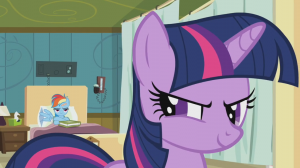
“I have a manipulative speech ready that will get you so many pain meds that you’ll need pain inducing drugs just to keep you on the pain scale. Crap, I think your charge nurse heard my soliloquy.”
On the drive home I thought about my teacher’s words. I realized something I decided was probably the biggest gift to myself.
I came up with two rules for myself:
1. Whenever I didn’t know something, I would ask about it.
This includes what words mean, things I claim to be an expert on, and things that people would probably prefer not to talk about.
2. I would let people talk to me about any subject.
I let my cousins and some of my friends teach me about cars. I’ve let my sister (a women’s health nurse) teach me about different speculum, benefits of clear plastic over metal, and that some of them have lights. My mom taught me about pain management in hospitals. I’ve had people talk to me about all kinds of subjects from Apple products to humor theory to rollercoasters to Wutang Clan.
If you don’t want to hear about something, it’s probably, because you don’t know enough to appreciate it.
These rules will help you develop a sense of curiosity and wonder for the human creature. Something that should show up in your writing.
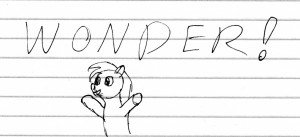
This is from my lecture notes last fall when my Professional Writing Core teachers were explaining that curiosity and wonder are at the center of all art.
Now people will go out and people watch. Wonderful activity, but also very shallow and superficial. You’ll only get the surface without context. If you talk to a person, they will teach you about entirely new ways of seeing the world, maybe these ways aren’t always positive. Of course this is granted they even want to talk to you.
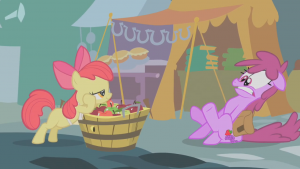
“Aaah! A humanities major working retail! Get your low income potential and broken dreams away from me!”
“That’s interestin’ and so tellin’ about yuh social background, upbringin’, ideologies, and yuh way of life.”
Most people want to talk about things. Some people will even talk to you about the worst tragedy to ever happen to them. More people will tell you these things if they feel you’ll listen and understand.
I won’t tell someone to stop talking. I’ll interrupt, because I’m so excited about the conversation, but I won’t tell them to stop talking.
It’s beautiful. The human being. I was with a girl and angry at the world. I said, “I have never felt so misanthropic.”
She laughed (and not just at how angsty I was being), “You’re not a misanthrope. You’re an anthropologist. I’ve never seen someone so in love with people.” This was a surprise to me. I didn’t realize this was true. I also didn’t realize she could ever show this level of understanding about me. At least I used to think that. It must be untrue since I fell in love with her.
Talking to people, reading their blogs will expand your mind more than anything (Even if it’s starting to get unfocused, rhapsodize-y, and digressive). You’ll never know what you’ll learn and from where. Did you think you would find a passionate, sincere, intellectual blog about the human condition with a bunch of ponies on it?
I’ve talked to a drunk punk rock bassist in the Inland Empire about his view on the world, it was disparate from the views of a privileged girl I talked to in Orange County, but there is always confluence. We want the same things: love, respect, to feel special, safety, etc.
We all have the fear of time and being mortal adding pressure on our desires. From this is conflict. From this we do our worsts to each other and even our bests. When written with justice to the characters, this conflict will allow you to see yourself in the worst of people as well as the best. We are all the same, it’s the priorities and the situations that make us different, whether by nature or nurture.
There’s a price to this, the more you learn what people want and their motivations, the harder it is to judge them. Although, this seems positive, keep in mind that these people will make you mad. They will hurt you. You will feel mad and stay awake at night. You’ll wish you were just wondering why they would do something to hurt you, but you’ll know why. You’ll know their motivations, what they want in life. You’ll know that if you were them, desperate for the same petty things, then you would hurt other people for them as well. It would be hard and wrong for you to hate them for being who they are. So you don’t take any action, even though you’re hurt.
With this understanding there’s nowhere for your hate and frustrations to go. You’re stuck with them.
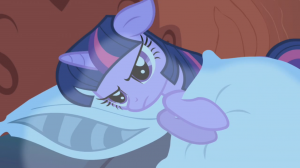
“I understand that her belief system doesn’t allow for the idea of platonic friendships between people of opposite genders, but that doesn’t mean she is entitled to treat me like a second class citizen even if she is trying to keep me from ‘falling for her.’ God that’s so egotistical, it’s sick, but then that belief has probably just been reenforced by a lifetime of being a pretty girl and having every guy friend fall in love with her, requiring her to explain why things wouldn’t work out. The poor girl probably lost a lot of friends growing up. Man this sucks that her past is determining why I don’t get to have my friend! After all the times I’ve looked out for her! Well, this might be her form of looking out for me and my feelings… Why am I always the expendable one?! I hate this.”
Sorry, where was I? Oh, yeah, people will reveal more to you than they realize. They will tell you their ideologies, their secrets, their experiences even if they don’t intend to. And isn’t understanding how other people think and act what character work is all about?
That’s not necessarily a rhetorical question. Let me know how you think about anything I’ve brought up. Clearly, I’m interested.
PS. For more on this subject read Virginia Woolf’s short story “An Unwritten Novel” to get the value of people watching and some of its drawbacks. For the benefits of talking to people and how you can learn things about their character that they themselves don’t even realize they are saying read Robert Browning’s “My Last Duchess”
Read More
